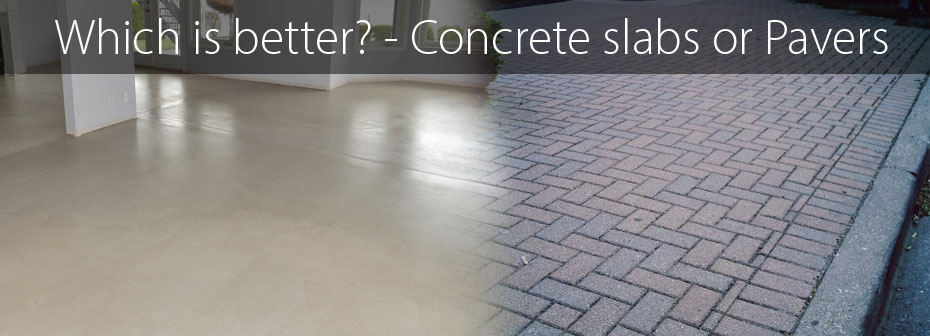When it comes to designing and setting up a walkway or a driveway, you may choose from several viable options. One thing that you must remember in such cases is that you should maintain a fine balance between aesthetics and functionality. You should not only choose a material that delivers good performance for the present moment but also enhances its lifespan for the future. The two of the most popular choices for the walkways or driveways are concrete slabs and pavers. The concrete slabs are poured concrete which is set up in large blocks and they are considered to be some of the most durable options.
These concrete slabs can easily resist rough usage, acid stains, and other types of impact damages. The pavers are also a great option for setting up walkways or driveways. Frequently termed as brick pavers or paving stones, the pavers function as tiles of concrete interlocking together. Plenty of people tend to go with pavers surely for the flexibility that they have to offer. This along with their appearance and color is sure to convince a lot of people about the benefits of using the pavers for making the walkway or a driveway.
It is important to note that both pavers and concrete come with their share of advantages and shortcomings. So, let’s compare these two to know their benefits and shortcomings.

Aesthetics and beauty
Aesthetically the paved concrete blocks look awesome and look better than the poured concrete. You get to have so many great patterns which means that you get to choose exactly the way your walkway or driveway looks like. There are also differently colored and styled paving blocks that you can combine to create a distinct look. You can get the concrete embedded or strained with stones for enhancing its appearance and making it look more attractive. The stamped concrete stones appear very similar to the paving stones.
Cost
The cost of the poured concrete tends to be less initially when you compare it to the paved blocks. However, it is important to also take into consideration the maintenance and repairs you need to manage over a long time as they typically tend to far exceed such initial costs of the paved blocks. Therefore, you need to go with pavers if you are looking for value in the long run. Most of the companies that offer you such products are also going to inform you about the repairing and maintenance requirements so that you can make an informed decision from that.
Installation
The installation of the materials is yet another factor that you have to think about when you are trying to choose between concrete slabs and pavers. The concrete slabs are rather easy to install but they can take time to dry up. The process of installing the concrete slabs may also involve steps like excavation, getting the foundation prepared, and developing the forms needed for concrete pouring. It is also important to stabilize the ground as otherwise, the concrete is going to crack in due course of time. There have been many cases where poorly graded concrete has led to the formation of low spots. Such low spots eventually hold water and give rise to stain marks on the surface of the concrete.
On the other hand, it can take more time and labor to install the paving stones but the whole pavement is immediately ready to use once the installation has been completed. No curing time is needed for paving stones. It is vital to perform the processes of excavation and grading, creating a sub-base layer and making the base compact. The paver blocks should be subjected to further compaction and then sealed even after once they have been laid in place. This can help in achieving the best results. Grading issues can be resolved at a later point by replacing or readjusting the paving blocks.
Durability
The concrete slabs are prone to develop cracks if the ground underneath them tends to shift. Therefore, the durability of the slabs is dependent on the shifting of the earth’s surface below. In case they are incorrectly graded, water can get accumulated over these concrete slabs. This is a possibility that does not exist with the paver blocks. This is because of the many joints within the paver blocks. When the grading is properly achieved, there won’t be any water clogging or drainage issues. The paving blocks make it easier for the water to gently seep into the earth and make it easier to raise the level of ground water. When installed properly, the paving blocks can deliver lifelong performance and reliability. They can withstand more pressure and load than the concrete slabs. The paving blocks are also characterized by better load distribution and even dispersion of weight or pressure.
Maintenance
Cracks developed on the concrete surface should be sealed. However, this reduces the product strength as well as the cosmetic value of the driveway because of mismatched coloring. Eventually, this can also be a very costly option. The Atmospheric effects can cause pits and stains on them.
Maintenance and repair are easy with the paved stones as they can be replaced conveniently. If there is an underground issue, the repairmen can remove some paver blocks and manage the problem. The maintenance cost for pavers is also less compared to the concrete slabs.
Value addition
Concrete is often slippery when wet and the only way to avoid it is to get the surface grounded. The same effect can also be achieved with an anti-skid agent.
Paving blocks are typically non-skid which means that they offer better traction comparatively. These blocks also provide great aesthetic value after installation.
Comments
Post a Comment